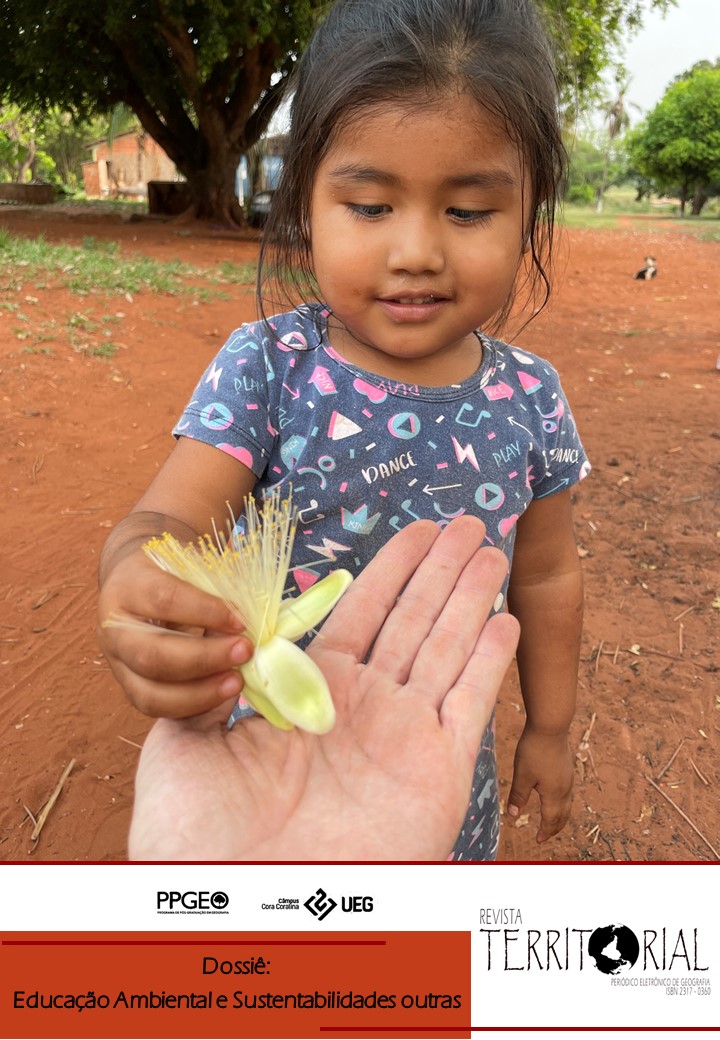Environmental Learning Today
Palavras-chave:
Environmental Education, World Community of Environmental Education, Learning, Ecological Transition, PolycrisisResumo
Despite early definitions, perfectly aware of the challenges and values of interdisciplinary and transdisciplinary education, there is sometimes a short-sighted misconception of Environmental Education, often far removed from its theoretical foundations in trivial practices. According to David W. Orr, all education is environmental education because we live in an interconnected and complex world where transformative, anticipatory, and participatory Environmental Education aims to empower people, change paradigms, and build better futures. A radical change in educational systems is needed, and Environmental Education researchers and practitioners can contribute to this. Nevertheless, we may need a “New” environmental education.
Downloads
Referências
CAPRA, Fritjof. The web of life: a new scientific understanding of living systems. New York: Knopf Doubleday Publishing Group, 1996.
CARTER, Robert L.; SIMMONS, Bora. The history and philosophy of environmental education. In: BODZIN, Alec M.; KLEIN, Beth Shiner; WEAVER, Starlin (ed.). The inclusion of environmental education in science teacher education. Dordrecht: Springer, 2010.
CLARK, W. B. The environmental education banner. Environmental Education, v. 1, n. 1, p. 7–10, 1969.
GRIGGS, D. et al. (ed.). A guide to SDG interactions: from science to implementation. Paris: International Council for Science (ICSU), 2017.
ICSU; ISSC. Review of the Sustainable Development Goals: the science perspective. Paris: International Council for Science (ICSU), 2015.
INDEPENDENT GROUP OF SCIENTISTS appointed by the Secretary-General. Global Sustainable Development Report 2019: the future is now – science for achieving sustainable development. New York: United Nations, 2019.
LE BLANC, D. Towards integration at last? The Sustainable Development Goals are a network of targets. DESA Working Paper, n. 141, 2015.
MORIN, E. La tête bien faite: repenser la réforme, réformer la pensée. Paris: Seuil, 1999.
MORIN, E. Seven complex lessons in education for the future. Paris: UNESCO, 2001.
MORIN, E. La Méthode, l’humanité de l’humanité, t. 5: L’Identité humaine. Paris: Seuil, 2003.
MORIN, E.; BOCCHI, G.; CERUTI, M. Un nouveau commencement. Paris: Éditions du Seuil, 1991.
MORIN, E.; KERN, B. Homeland Earth: a manifesto for the new millennium. Cresskill: Hampton Press, 1999.
NILSSON, M.; GRIGGS, D.; VISBECK, M. Map the interactions between Sustainable Development Goals. Nature, v. 534, p. 320–322, 2016.
ORR, D. W. Ecological literacy: education and the transition to a postmodern world. Albany: State University of New York Press, 1992.
ORR, D. W. Earth in mind: on education, environment, and the human prospect. Washington, D.C./Covelo, California: Island Press, 1994.
ROCKSTRÖM, J. et al. A safe operating space for humanity. Nature, v. 461, p. 472–475, 2009a.
ROCKSTRÖM, J. et al. Planetary boundaries: exploring the safe operating space for humanity. Ecology and Society, v. 14, n. 2, art. 32, 2009b.
STAPP, W. B. et al. The concept of environmental education. Environmental Education, v. 1, n. 1, p. 30–31, 1969.
SUBCOMMISSION ON QUATERNARY STRATIGRAPHY. Anthropocene Working Group. Disponível em: http://quaternary.stratigraphy.org/working-groups/anthropocene/. Acesso em: 25 jul. 2024.
Downloads
Publicado
Edição
Seção
Licença
Direitos autorais (c) 2025 Revista Territorial (ISSN 2317-0360)

Este trabalho está licenciado sob uma licença Creative Commons Attribution 4.0 International License.
Esta revista eletrônica oferece acesso livre e imediato ao seu conteúdo, seguindo o princípio de que disponibilizar gratuitamente o conhecimento científico ao público, contribuindo assim para a democratização do conhecimento.




